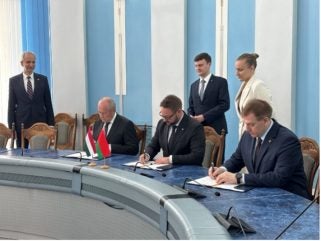
Nuclear co-operation between Belarus and Hungary was discussed during a meeting in Minsk between Belarusian Foreign Minister Sergei Aleinik, Energy Minister Viktor Karankevich and Hungary’s Minister of Foreign Affairs & Trade, Peter Szijjártó, accompanied by delegations from both countries including the heads of 24 Hungarian companies. Karankevich noted that only two months had passed since his previous meeting with Szijjártó in Sochi. “During this time, Belarusian and Hungarian specialists have done a lot of work to promote bilateral mutually beneficial cooperation in areas of mutual interest,” he said.
The meeting was preceded by bilateral talks between the foreign ministers and as well as a meeting of the Belarusian-Hungarian intergovernmental commission on economic cooperation, which they co-chair. Following the talks, the parties signed the protocol of the meeting of the intergovernmental commission; a programme of cooperation between the Ministry of Foreign Affairs of Belarus and the Ministry of Foreign Affairs and Trade of Hungary for 2024-2025; a memorandum of understanding to deepen cooperation in nuclear energy between the Energy Ministry of Belarus and the Ministry of Foreign Affairs and Trade of Hungary.
In addition, the Belarus Energy Ministry signed a roadmap for cooperation between the Belarus NPP and Hungary’s Paks NPP. It defines the main areas of joint work of Belarusian and Hungarian nuclear specialists for 2024-2025, including personnel training, scheduled maintenance and radioactive waste management. The roadmap further developed a memorandum of understanding concluded in April 2023 between the Belarusian Energy Ministry and the Paks II NPP.
The Paks II project was launched in 2014 by an inter-governmental agreement between Hungary and Russia for two VVER-1200 reactors (units 5&6) to be supplied by Rosatom. The existing Paks NPP comprises four VVER-440 power units. Following life extension work it is assumed that they will operate until at least 2052-2057. Paks currently provides half of all generated and one third of the consumed electricity in Hungary.
The Belarus NPP comprises two VVER-1200 power units. Russia supported the project with a $10bn to cover 90% of the overall cost. Unit 1 began operation in 2021 and unit 2 in 2022. The plant will supply about 40% of the electricity needs of Belarus.
The road map was signed by Director General the Belarus NPP, Sergei Babovich; the Director General of Paks-II Gergely Jákli; and Deputy Chief Technical Officer at MVM Paks NPP, Pál Tóth.
Yury Shmakov, the First Deputy General Director and Chief Engineer of Belenergo said Belarusian and Hungarian specialists will share best practices both in the field of equipment operation and personnel training. “Certain work has already been done, and we understand how we will move forward to show that the use of atomic energy for peaceful purposes is very important for the whole world,” he said.
In turn, Gergely Jákli stressed that Paks II, as a NPP under construction, was interested in attracting Belarusian builders to work on the site. Relevant opportunities are currently being developed. “The construction experience of Belarus is of great importance and highly valued by us, we are most interested in its study,” he stated. Sergei Babovich noted that the Belarus NPP had made it possible to significantly change the country’s economy.
During his visit to Minsk, Szijjártó noted: “Our determination and our point of view are unequivocal: [Hungary is ready to co-operate] in all areas that are not subject to sanctions. Hungary is interested in developing liaisons, and we will provide any support for this. We are talking about it openly, hiding nothing. Hungary will not support the EU decisions that negatively affect the national interests of the country, its economy and that will produce a negative effect on the development of contacts with Belarus.”
He wrote on his Facebook page: “Sanctions do not work. That is why our position is clear: less sanctions, more cooperation! Now we will increase economic cooperation with Belarus in areas not affected by sanctions. At today’s meeting of the Joint Economic Committee, we will sign our agreement on nuclear cooperation and also carry out 92 inter-company meetings.”






